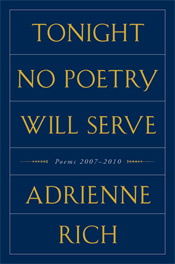Adrienne Rich has said of her new collection, and every synopsis has quoted, “I believe almost everything I know, have come to understand, is somewhere in this book.” This is no minor promise from such a lion of the literary sphere—venerated public intellectual, radical feminist and leftist, recipient (and refuser) of the highest awards for recognition of poetry. Her newest collection, Tonight No Poetry Will Serve: Poems 2007-2010, is accompanied by a grand promise and yet a grander challenge.
It is easy to feel that poetry offers little for an access point, contemporary poetry least of all, so interpreting the promised knowledge and understanding here is not simple. Rich’s new collection is a slender volume of lyric notes, a vivid outline of the contemporary world. Her pieces are elliptical, often free-form, short. She is, of course, a master of the craft; a concise image will not only sound sharp and clear, but unwind into countless threads of implication.
As always, her voice follows the points of conflicts, slides down into the fault lines of modern society, a knife skimming along already raw fractures. Rich tracks the mapping of the political and the personal onto each other. She finds a personal sphere rife with pain, toiling brokenly under the grinding wheels of institutional power. At times, she is overtly cynical; in “Scenes of Negotiation,” she writes, “Being or doing: you’re taken in for either, or both. Who you were born as, what or who / you chose or became. Facing moral disorder head-on, some for the first time, on behalf of / others. Delusion of inalienable rights. Others who’ve known the score all along” At other times, she shows us struggle in a more playful light, as in “Turbulence”:
…The plane’s
supposed to shudder, shoulder on
like this. It’s built to do that. You’re
designed to tremble too. Else break
Higher you climb, trouble in mind
The collection’s titular poem is a beautiful example of Rich’s ability to illuminate the threads weaving together the political, personal and linguistic. The poem begins with two views, perhaps of a lover, first contemplating a new moon, then lying down, “asleep but not oblivious / of the unslept unsleeping / elsewhere.” The poem intensifies into a final, taut scene of linguistic torture:
verb force-feeds noun
submerges the subject
noun is choking
verb disgraced goes on doing
now diagram the sentence
The language of the final encounter is redolent of so many news stories, so much of the ultra-graphic information dumped into public consciousness daily, so many sensational descriptions of the abuses of prisoners at Guantánamo Bay. Rich fuses the consciousness of her sleeping subject from earlier in the poem, a political and military reality far beyond that consciousness and yet inlaid in it, and the impotent frenzy of public rhetoric, perhaps of language itself.
Her work stakes out its place in a world it frames as unquestionably conflictual. It stands as a striking refusal to succumb to certain tendencies of contemporary thought—that poetry is irrelevant, and that the personal and the political are anything but deeply, violently connected. Rich acknowledges, in fact frames “Tonight No Poetry Will Serve” with the troubled position of poetry in contemporary life. She addresses this in an intimate, personal manner, as in the lovely, unsettling, inspiring address to her poetic alter ego in “Axel Avákar,” and on a larger scale, as in the “Ballade of the Poverties,” in which she writes, “Prince let me tell you who will never learn through words / There are poverties and there are poverties.”
Yet Rich’s work pays homage to a long and varied poetic history, both through allusion and form, and simultaneously manages to stoke a rebellious fire. She subtly crafts, boldly provokes, slyly suggests, evoking a world of image and meaning.
This, by the way, is good poetry.
This post may contain affiliate links.









